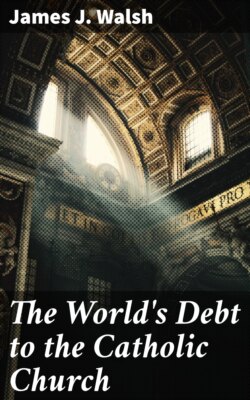Читать книгу The World's Debt to the Catholic Church - James J. Walsh - Страница 3
На сайте Литреса книга снята с продажи.
Preface
ОглавлениеTable of Contents
For some nineteen hundred years the Church established by Christ when He said, "Go teach all nations," has stood for all that is best in human life. The very fact that it has endured the cataclysmic changes from Roman Empire through Middle Ages and Renaissance down to modern times singles it out as a unique institution in the history of humanity. During all these profoundly trying vicissitudes of the race the Church has fostered the sense of beauty and the sense of duty. These are the sources of happiness for mankind more than any other factors. Architecture, painting, sculpture, music, poetry and the arts and crafts are indebted to the Church for constant inspiration, for the subjects that have touched men most deeply and for the opportunity to display art for the benefit of the mass of the people--the artist's greatest stimulus to achievement. The arts have been re-created over and over again, poetry provided with lofty motives and the drama reborn in the service of the Church.
"Art sees as God sees" would seem to have been the aesthetic criterion of churchmen. Besides, the Church has fostered and encouraged education, feminine as well as masculine, provided a vocation for the woman who felt that she was not called to matrimony and has cultivated all the fruits of the deeper thinking, philosophy, ethics, science. Men who have not studied the history of science as we now have it doubt this last but the revolutionizers of science all down the centuries, Roger Bacon, Copernicus, Vesalius, Galileo, Morgagni, Mendel, were all faithful sons of the Church, three of them indeed churchmen. The supposed persecution of some of these proves to be largely but another example of the myth making tendency in mankind when religious feelings are involved.
Christ came to give men life and give it more abundantly--not the life of the body but of the spirit. The history of His Church is the story of the spiritual life among men. Of divine origin, its members are human and it would be futile to expect perfection. Among Christ's own chosen Apostles, one betrayed and one denied, so that the Church would not be following in its Founder's footsteps--would not be Apostolic--unless there were a fair proportion of very human elements in it even among the leaders. The Church has stood for all that is best in human life as no mere human institution has ever done. "The witchery of trifles that obscures good things" is still active and will be so long as this stage of humanity lasts. But the Church has by its cultivation of the sense of duty made life significant by distracting human attention from self to our fellows. It is only when its achievements are all gathered together even in the inadequate fashion possible in a brief volume of this kind, that it becomes easy to realize that here is the supernatural in the world.
